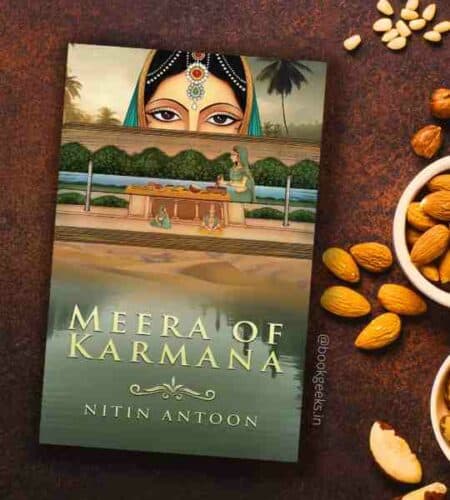PLOT: 3.5/5
WRITING: 3.5/5
OVERALL: 3.5/5
Themes: Spiritual Fiction, Set in Ancient Indian Village, Ayurveda, Power of Healing
Though I am not new to spiritual fiction, it’s been a while since I last read a book that had spirituality infused in a fictional story. Ranjith Radhakrishnan’s “Rama of the Axe” was my last memorable read, though spirituality was more of a side theme there.
Nitin Antoon’s “Meera of Karmana,” however, stands out differently. In terms of the theme alone, it resonates with Paulo Coelho’s “The Alchemist” and Robin Sharma’s “The Monk Who Sold His Ferrari.”
What is the story like?
In an undisclosed era in ancient Bharatam, under the rule of the magnanimous and benevolent King Bharata, lies the small village of Karmana. Its people are known for their generosity, kindness, and friendliness, always ready to lend a helping hand to those in need. Following the ancient ways of the world, they hold respect and consideration for every life as the cornerstone of their happy existence. Bound by close-knit community ties, they cherish their customs and traditions dearly.
It is in this village, that Meera, our female protagonist lives. She is smart and determined and seeks a purpose that not only aligns with her spiritual journey but also serves to uplift those in her community. After the death of her parents, she embarks on a journey of knowledge and wisdom. A wise Guru acts as her light and imparts her the secrets of Ayurveda, the ancient science of healing and well-being.
She is also accompanied by the ethereal and radiant Latika, her personal Devi, who acts as a constant presence guiding Meera on her spiritual journey. As Meera embarks on this transformative journey, the readers too partake in something from her experience. Along with her, they too witness the power of self-healing and discovery.
My review
Meera shines through the book
At the heart of this book shines the profound wisdom of Ayurveda intertwined with the journey of our protagonist, Meera. Meera has the fortune of being born in a place and time when women held equal respect and equal freedom as men. In this way, she finds herself surrounded by a supportive community that champions her aspirations.
Throughout the journey, she finds people who are there to guide her and love her, but even then, the journey, which is nothing short of miraculous, is all her own. Her path is one she must navigate alone, and this she does, showcasing her resilience and strength. Her character is both remarkable and inspirational.
The love for Indian customs, traditions, and sciences
I love the way ancient Indian society has been depicted. It beautifully portrays the deep reverence and love for all living beings, including animals, plants, and the gifts of nature. There are a few secrets of Ayurveda to be learned from the pages of the book, revealing its transformative and healing potential. Additionally, the book explores the intrinsic connection between Ayurveda and Yoga, shedding light on how these two ancient disciplines complement each other in promoting health, balance, and spiritual growth.
Spirituality at its best
The elements of spirituality are infused with careful consideration and all characters and their actions seem to be perfectly aligned with their greater purpose. Characters like Guru Ma and Devi Latika bring a necessary diversity to the narrative, enriching the story with their unique perspectives and insights. It doesn’t need much effort to understand that the book is women-centric, with all of the major characters as strong and empowered women.
Other elements
There are elements in the book, that to a Westerner would seem like magical realism, but to an Indian audience, they signify the inherent Indian spirituality and its profound powers. I love how the book masterfully addresses relevant questions in today’s context, offering guidance toward a more holistic, healthy, and spiritually fulfilling life.
What I didn’t like?
The use of extensive philosophy, at times, feels repetitive and detracts from the narrative’s momentum, slowing down the story’s progress.
Also, I felt a strong disconnect between the climax and the rest of the book. Though it is a welcome change that breaks the monotony and introduces a new dimension to the story, it surfaces rather abruptly and seems incongruous with the rest of the book.
In the end
In the end, Meera of Karmana is a spiritual fiction that would cater to readers with a penchant for spiritual exploration, Ayurvedic wisdom, ancient wisdom, and women-centric narratives. Those intrigued by ancient knowledge and the empowerment of strong female characters will likely find much to appreciate within its pages.
Can’t wait to read it? Buy your copy of Meera of Karmana using the link below.
